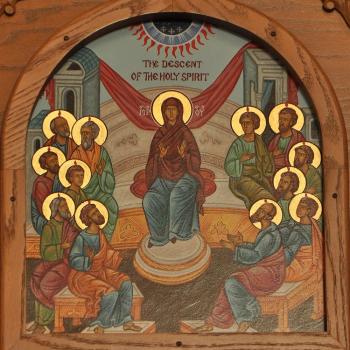This is the second post of a series discussing the sacrament of confirmation. Click here to read part one.
Scripture talks about those who have received the Holy Spirit, that is, those who have been anointed or sealed by the Spirit. When reading such texts, we must not consider the word “sealed” as being merely symbolic. It represents an event. Christians receive the Holy Spirit in the laying on of hands, in the anointing of the holy chrism oil upon them, so that through it, they are said to be sealed by the Holy Spirit. Therefore, when Paul wrote of being sealed to the Corinthians, they all had as a common understanding this special imposition of the Holy Spirit through the laying on of hands: “But it is God who establishes us with you in Christ, and has commissioned us; he has put his seal upon us and given us his Spirit in our hearts as a guarantee” (2 Cor. 1:21-22 RSV). Likewise, to the Ephesians, Paul wrote of the seal of the Holy Spirit which they also had received: “In him you also, who have heard the word of truth, the gospel of your salvation, and have believed in him, were sealed with the promised Holy Spirit, who is the guarantee of our inheritance until we acquire possession of it, to the praise of his glory” (Eph. 1:13-14 RSV).
![The Apostles confront Simon Magus by Avanzino Nucci [Public domain], via Wikimedia Commons](https://wp-media.patheos.com/blogs/sites/637/2017/06/Nucci_Avanzino_-_Petrus_Auseinandersetzung_mit_Simon_Magus_-_1620-259x300.jpg)
Now when the apostles at Jerusalem heard that Samaria had received the word of God, they sent to them Peter and John, who came down and prayed for them that they might receive the Holy Spirit; for it had not yet fallen on any of them, but they had only been baptized in the name of the Lord Jesus. Then they laid their hands on them and they received the Holy Spirit. Now when Simon saw that the Spirit was given through the laying on of the apostles’ hands, he offered them money, saying, “Give me also this power, that any one on whom I lay my hands may receive the Holy Spirit.” But Peter said to him, “Your silver perish with you, because you thought you could obtain the gift of God with money! You have neither part nor lot in this matter, for your heart is not right before God. Repent therefore of this wickedness of yours, and pray to the Lord that, if possible, the intent of your heart may be forgiven you. For I see that you are in the gall of bitterness and in the bond of iniquity.” And Simon answered, “Pray for me to the Lord, that nothing of what you have said may come upon me.” (Acts 8:14-24 RSV).
There is, therefore, a special reception of the Holy Spirit available to believers, and as this pericope indicates, it is normally received after baptism, just as the descent of the Holy Spirit upon Jesus occurred after his baptism. While baptism can, in theory, be dispensed by anyone, the gift of the Holy Spirit through the laying on of hands is not; Simon would not need to ask for that authority if it was given to all Christians. It was shown to be a special privilege to those in positions of authority, and as the Apostles said in response to Simon, it is detrimental to the office, and a sin, to seek it out as a thing of power and glory which can be and be bought and sold. Simon Magus, as tradition indicates, did not appreciate this condemnation and so started his own religious practice and belief, claiming to be a spiritual authority who rivaled the Apostles themselves.














